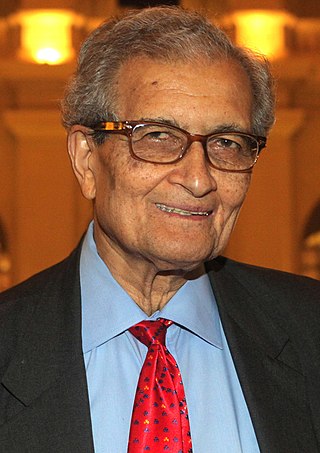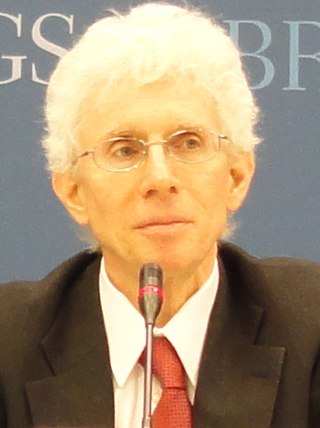
Amartya Kumar Sen is an Indian economist and philosopher. Sen has taught and worked in England and the United States since 1972. In 1998, Sen received the Nobel Memorial Prize in Economic Sciences for his contributions to welfare economics. He has also made major scholarly contributions to social choice theory, economic and social justice, economic theories of famines, decision theory, development economics, public health, and the measures of well-being of countries.

A political campaign is an organized effort which seeks to influence the decision making progress within a specific group. In democracies, political campaigns often refer to electoral campaigns, by which representatives are chosen or referendums are decided. In modern politics, the most high-profile political campaigns are focused on general elections and candidates for head of state or head of government, often a president or prime minister.
Direct election is a system of choosing political officeholders in which the voters directly cast ballots for the persons or political party that they wanted to see elected. The method by which the winner or winners of a direct election are chosen depends upon the electoral system used. The most commonly used systems are the plurality system and the two-round system for single-winner elections, such as a presidential election, and proportional representation for the election of a legislature or executive.
David Jonathan Andrew Held was a British political scientist who specialised in political theory and international relations. He held a joint appointment as Professor of Politics and International Relations, and was Master of University College, at Durham University until his death. He was also a visiting Professor of Political Science at Libera Università Internazionale degli Studi Sociali Guido Carli. Previously he was the Graham Wallas chair of Political Science and the co-director of the Centre for the Study of Global Governance at the London School of Economics.

William Arthur Galston is an American author, academic, and political advisor, who holds the Ezra K. Zilkha Chair in Governance Studies and is a senior fellow at the Brookings Institution. Formerly the Saul Stern Professor and Dean at the School of Public Policy at the University of Maryland and a professor of political science at the University of Texas, Austin, Galston specializes in issues of U.S. public philosophy and political institutions, having joined the Brookings Institution on January 1, 2006.
David Walter Runciman, 4th Viscount Runciman of Doxford,, is an English academic and podcaster who until 2024 taught politics and history at the University of Cambridge, where he was Professor of Politics. From October 2014 to October 2018 he was also head of the Department of Politics and International Studies. In April 2024 he decided to resign his position at the university to focus on his podcast full-time. He was subsequently made Honorary Professor of Politics.
Youth suffrage is the right of youth to vote and forms part of the broader universal suffrage and youth rights movements. Most democracies have lowered the voting age to between 16 and 18, while some advocates for children's suffrage hope to remove age restrictions entirely.
In political science, political apathy is a lack of interest or apathy towards politics. This includes voter apathy, information apathy and lack of interest in elections, political events, public meetings, and voting.

Pippa Norris is a British American political scientist specializing in comparative politics. She is the McGuire Lecturer in Comparative Politics at the Harvard Kennedy School at Harvard University, and she has served as the Australian Laureate Fellow and Professor of Government and International Relations at the University of Sydney, and Director of the Electoral Integrity Project.

Stephen Gill, FRSC is Distinguished Research Professor of Political Science at York University, Toronto, Ontario, Canada. He is known for his work in International Relations and Global Political Economy and has published, among others, Power and Resistance in the New World Order, Power, Production and Social Reproduction, Gramsci, Historical Materialism and International Relations (1993), American Hegemony and the Trilateral Commission (1990) and The Global Political Economy: Perspectives, Problems and Policies.
A hybrid regime is a type of political system often created as a result of an incomplete democratic transition from an authoritarian regime to a democratic one. Hybrid regimes are categorized as having a combination of autocratic features with democratic ones and can simultaneously hold political repressions and regular elections. Hybrid regimes are commonly found in developing countries with abundant natural resources such as petro-states. Although these regimes experience civil unrest, they may be relatively stable and tenacious for decades at a time. There has been a rise in hybrid regimes since the end of the Cold War.

Jason F. Brennan is an American philosopher and business professor. He is the Robert J. and Elizabeth Flanagan Family Professor of Strategy, Economics, Ethics, and Public Policy at the McDonough School of Business at Georgetown University.

Ilya Somin is a law professor at George Mason University, B. Kenneth Simon Chair in Constitutional Studies at the Cato Institute, a blogger for the Volokh Conspiracy, and a former co-editor of the Supreme Court Economic Review (2006–2013). His research focuses on constitutional law, property law, migration rights, and the study of popular political participation and its implications for constitutional democracy.
Stephen Coleman is Professor of Political communication at the University of Leeds. He was born in 1957. He is the author or editor of ten books and over a hundred articles on politics and communication. He is an advocate of direct representation via the Internet. He has been described as a "leading commentator" on online democracy. He has led independent evaluations of the UK televised election debates since 2010 and has worked with the UK Health Security Agency to understand how different segments of the population respond to pandemic guidance in specific ways.

Ann Macintosh is Emeritus Professor of Digital Governance at the University of Leeds.

Michael Bruter is Professor of political science and European politics at the London School of Economics, where he directs the Electoral Psychology Observatory in collaboration with Sarah Harrison. He is also incoming Associate Vice President and Pro-Vice Chancellor for Research at the LSE and a co-founder of CODES Collaborative Democracy Solutions with Sarah Harrison, a venture also supported by the LSE which uses research findings from electoral psychology, electoral ergonomics, technology, and design to create new democratic tools. A discoverer of the sub-fields of electoral psychology and electoral ergonomics, Bruter is also a specialist in political behaviour, political psychology, elections, public opinion, research methods, comparative politics, political participation, political communication, youth politics, extremism, protest politics, and European politics.

Lisa Hill is Professor of Politics at the University of Adelaide, Australia. She has previously held positions at the University of Sydney and the Australian National University.
Elizabeth Jean Zechmeister is an American political scientist and Cornelius Vanderbilt Professor of Political Science at Vanderbilt University, noted for her research on comparative political behavior, public opinion, Latin American politics, and terrorism studies.
Susan Carol Stokes is an American political scientist and the Tiffany and Margaret Blake Distinguished Service Professor in the Political Science department of the University of Chicago, and the faculty director of the Chicago Center on Democracy. Her academic focus is on Latin American politics, comparative politics, and how democracies function in developing countries. Stokes is a member of the American Academy of Arts and Sciences. She was elected a member of the National Academy of Sciences in 2022.










